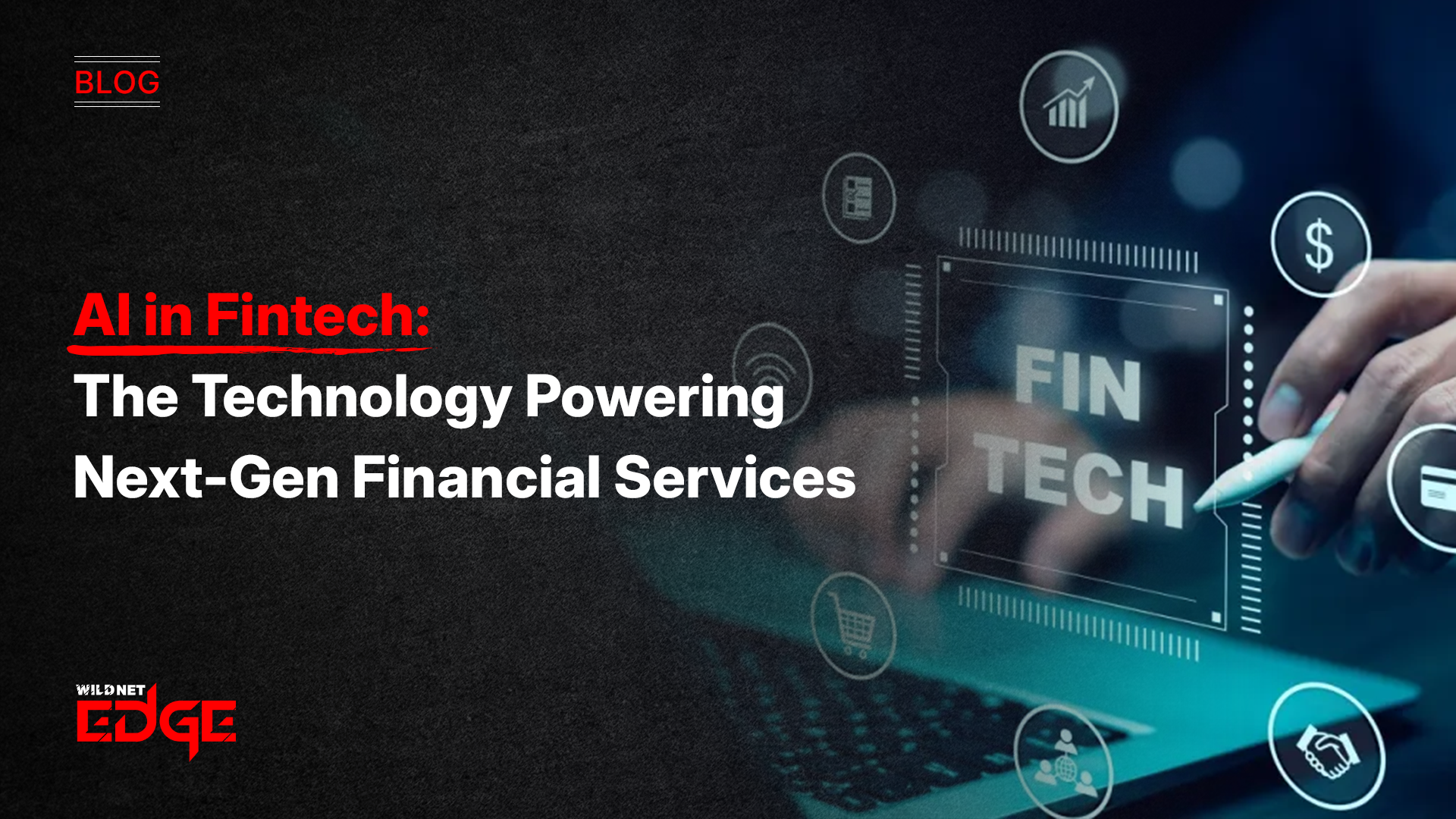If you’re building or scaling a fintech product, chances are you’ve already heard the buzz around AI in fintech. But beyond the headlines and jargon, here’s the truth: artificial intelligence isn’t just an add-on anymore, it’s the engine behind some of the most efficient, scalable, and customer-centric financial services being built today.
From fraud detection that works in real time to hyper-personalized wealth management apps and lightning-fast credit scoring, AI in the finance industry is rewriting how financial institutions operate. And this shift is no longer exclusive to large banks or Wall Street. Startups, challenger banks, and fintech SaaS platforms are all tapping into AI financial services to gain a serious edge.
In this blog, I’ll break down exactly how AI and fintech technology come together to power real-world use cases, why it matters for your product or business, and how you can move from experimentation to execution.
Why AI in Fintech Isn’t Optional Anymore
Fintech companies live and die by their ability to move fast, stay compliant, and deliver standout user experiences. That’s exactly where AI steps in, not as a futuristic gimmick, but as a practical enabler.
Here’s why AI in fintech is no longer a nice-to-have:
• Speed + Accuracy: AI-driven algorithms can process thousands of data points in seconds. Whether it’s loan underwriting, fraud detection, or investment decisions, AI lets you make faster, data-backed calls.
• Better Risk Management: Traditional risk models look backward. AI models adapt in real-time, learning from patterns to predict defaults, fraud, or market volatility before they hit your bottom line.
• Personalized Financial Products: From spending insights to credit recommendations, AI enables hyper-personalized experiences that users now expect, especially in consumer-facing fintech.
• Cost Efficiency: Automating compliance, KYC/AML checks, and support workflows with AI means you can scale operations without scaling headcount.
Bottom line: If you’re not actively integrating AI into your fintech stack, you’re already behind competitors who are.
Top Use Cases of AI in Fintech That Are Driving Real ROI
AI in fintech isn’t just hype. It’s delivering real, measurable business impact across the finance industry. Let’s break down the most valuable use cases—and what they mean for your roadmap.
- Fraud Detection and Prevention
AI-powered fraud systems detect anomalies in real time by analyzing behavioral patterns, transaction data, device metadata, and geolocation. Instead of relying on rules-based systems, they evolve with new threats, meaning fewer false positives and faster fraud resolution. - AI-Powered Credit Scoring
Fintechs can now assess creditworthiness using alternative data sources, social signals, spending behavior, app usage, rather than just traditional credit scores. AI credit scoring models expand financial inclusion and reduce lending risk. - Robo-Advisors and Wealth Management
AI chatbots and portfolio management tools are transforming how users invest. These systems analyze risk tolerance, market trends, and user goals to deliver personalized investment advice, at a fraction of the cost of traditional advisors. - AI in Customer Support (Conversational AI)
From resolving KYC issues to handling loan queries, AI-powered virtual assistants are now front-line support agents. They handle thousands of conversations simultaneously, improve satisfaction, and reduce ticket backlogs. - Regulatory Compliance Automation (RegTech)
AI can parse and interpret regulatory updates, monitor transactions for suspicious activity, and flag compliance risks instantly. It reduces manual oversight and ensures fintechs stay audit-ready. - Predictive Analytics for Financial Planning
AI helps forecast cash flows, spot churn risks, and recommend budgeting strategies in real time. Fintech tools that use predictive analytics deliver smarter financial decisions for both users and internal teams.
Real-World Use Cases of AI in Fintech That Actually Work
Let’s take this from theory to practice. Here are actual applications of AI in fintech technology that are making waves, and money:
| Use Case | How AI Powers It | Why It Matters |
| Fraud Detection & Prevention | Machine learning algorithms analyze thousands of transactions per second to flag anomalies | Reduces fraud losses, improves trust, and enables real-time action |
| Credit Scoring & Underwriting | AI evaluates alternative data (like transaction history, mobile usage) to assess creditworthiness | Opens access to credit for underserved markets and speeds up approvals |
| Personalized Financial Advice | AI bots and virtual advisors use real-time data to deliver budget tips, savings nudges, and investment guidance | Makes wealth-building accessible to users without financial advisors |
| Customer Service Chatbots | AI chatbots handle 24/7 queries from KYC to loan applications with human-like responses | Improves customer experience and slashes support costs |
| Algorithmic Trading | AI models predict market shifts and execute trades faster than humans can blink | Gives fintech platforms a performance edge over traditional trading desks |
| Regulatory Compliance | NLP-driven AI scans documents, monitors transactions, and ensures KYC/AML compliance | Reduces compliance costs and avoids penalties in highly regulated markets |
These aren’t far-off hypotheticals, they’re being used by startups and fintech giants alike to solve real business challenges.
How AI Is Reshaping Fintech Technology from the Ground Up
AI in fintech isn’t just a bolt-on innovation. It’s rewiring how financial services are designed, delivered, and scaled. Here’s what I mean:
- Decision-making is faster and smarter
From approving loans to identifying suspicious transactions, AI systems are helping fintech platforms act in milliseconds with high confidence. That speed changes the game, especially when user expectations are sky-high. - Financial access is becoming more inclusive
By analyzing non-traditional data sources, AI enables fintech startups to offer services like credit and insurance to people who were once invisible to traditional banks. That’s a big win for financial inclusion. - Products are getting hyper-personalized
AI in finance industry use cases are helping companies tailor user experiences, think custom investment plans or spending insights based on your habits, without needing an army of analysts. - Scaling happens without breaking things
With the right AI architecture, fintech apps can handle exponential user growth, thousands of transactions, and evolving regulations, all without adding dozens of people to the ops team.
The bottom line? AI is doing more than adding bells and whistles; it’s turning fintech tech stacks into lean, smart, and scalable ecosystems.
Key Challenges with AI in Finance Industry (And How to Tackle Them)
AI offers power, but it comes with some unique hurdles. Here’s what to watch out for:
- Data Silos: Fintech companies sit on massive data lakes, but without data unification, AI models won’t reach full potential.
- Model Transparency: Black-box models can lead to regulatory headaches. Use explainable AI (XAI) for sensitive decisions like credit approval.
- Compliance & Bias: Financial algorithms need to be bias-free and auditable. AI development must align with fintech regulations (GDPR, Fair Lending, etc.).
- Infrastructure: You need scalable cloud-native environments to handle model training, deployment, and monitoring.
Building trust with regulators and customers is just as important as building smart models.
Choosing the Right AI Development Partner for Fintech
AI in fintech requires cross-functional expertise, data science, finance, regulatory know-how, and software engineering. Here’s what to look for in an AI development company:
| Evaluation Criteria | Why It Matters |
| Experience in fintech technology | Domain knowledge shortens development cycles |
| Track record in AI financial services | Proven deployments ensure faster ROI |
| Compliance-first approach | Avoids costly regulatory missteps |
| Cloud-native & scalable stack | Prepares you for hypergrowth from MVP to production |
| Post-launch support | AI needs constant tuning, retraining, and upgrades |
AI in Fintech Is the Competitive Advantage You Can’t Ignore
If your fintech product doesn’t have an AI layer today, your competitor’s will tomorrow. Whether you’re looking to reduce fraud, personalize user journeys, or simply improve operations, AI is the tool that can make your product 10x smarter, faster, and more scalable.
At WildnetEdge, we help fintech startups and enterprises build AI-first products, from MVPs to mission-critical systems. Our team of AI-first developers combines AI software development services with deep fintech expertise to deliver scalable, secure, and compliant AI solutions.
Let’s turn your product into a fintech AI success story.

Nitin Agarwal is a veteran in custom software development. He is fascinated by how software can turn ideas into real-world solutions. With extensive experience designing scalable and efficient systems, he focuses on creating software that delivers tangible results. Nitin enjoys exploring emerging technologies, taking on challenging projects, and mentoring teams to bring ideas to life. He believes that good software is not just about code; it’s about understanding problems and creating value for users. For him, great software combines thoughtful design, clever engineering, and a clear understanding of the problems it’s meant to solve.
 sales@wildnetedge.com
sales@wildnetedge.com +1 (212) 901 8616
+1 (212) 901 8616 +1 (437) 225-7733
+1 (437) 225-7733















 ChatGPT Development & Enablement
ChatGPT Development & Enablement Hire AI & ChatGPT Experts
Hire AI & ChatGPT Experts ChatGPT Apps by Industry
ChatGPT Apps by Industry ChatGPT Blog
ChatGPT Blog ChatGPT Case study
ChatGPT Case study AI Development Services
AI Development Services Industry AI Solutions
Industry AI Solutions AI Consulting & Research
AI Consulting & Research Automation & Intelligence
Automation & Intelligence















